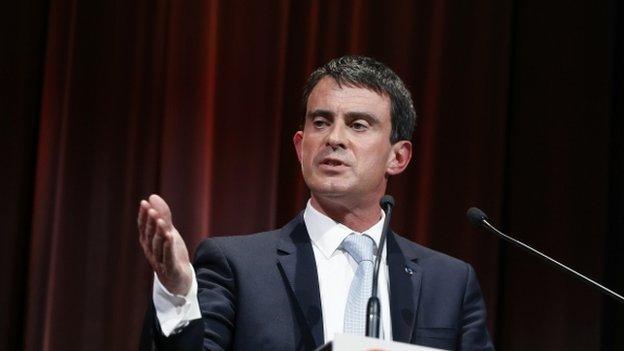France bids to reverse tech brain drain
- Published
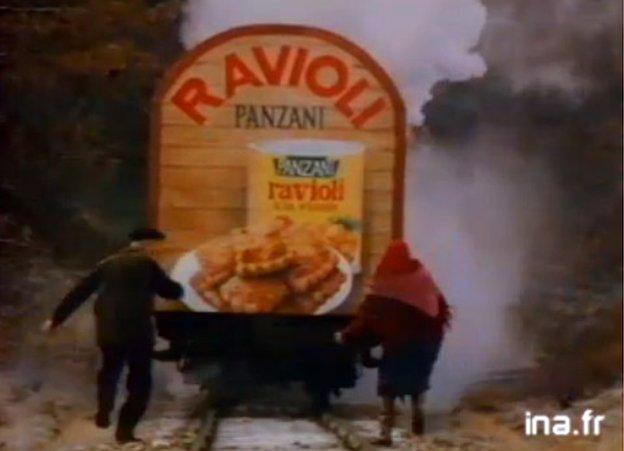
Reviens Leon! originally surfaced in a 1980s advert for pasta sauce
A popular French TV advert for pasta sauce from the 1980s showed a jolly rustic fellow chasing after a train that was laden with all sorts of lovely food.
"Reviens Leon! (Come back, Leon!)," shouts his portly wife. "I've got the same at home."
Today the catchphrase "Reviens Leon!" has been commandeered for a very different campaign: to lure back to France the thousands of tech whizz-kids who spent the last decade fleeing abroad.
In an open letter in Le Monde, the heads of 10 successful French start-ups pleaded with Silicon Valley expatriates to book their return flights to Paris.
"France is not the country it was when you left," they wrote.
"It is now full of the opportunities which you used to search for elsewhere. Today, we've got the same at home.
"It's in France that it is happening. So come back, Leon!"
Today great efforts are being made to show the world that France is no longer a land of "ossified structures, stultifying routines and petty-minded middle-managers" (to use the language of the letter).
Business transformation
The young economy minister and former banker Emmanuel Macron has made three trips abroad this year to high-tech conventions, most recently in Israel, external last week.
At each stop he urges investors to forget the cliches, and to focus on the business transformation that he says is under way.
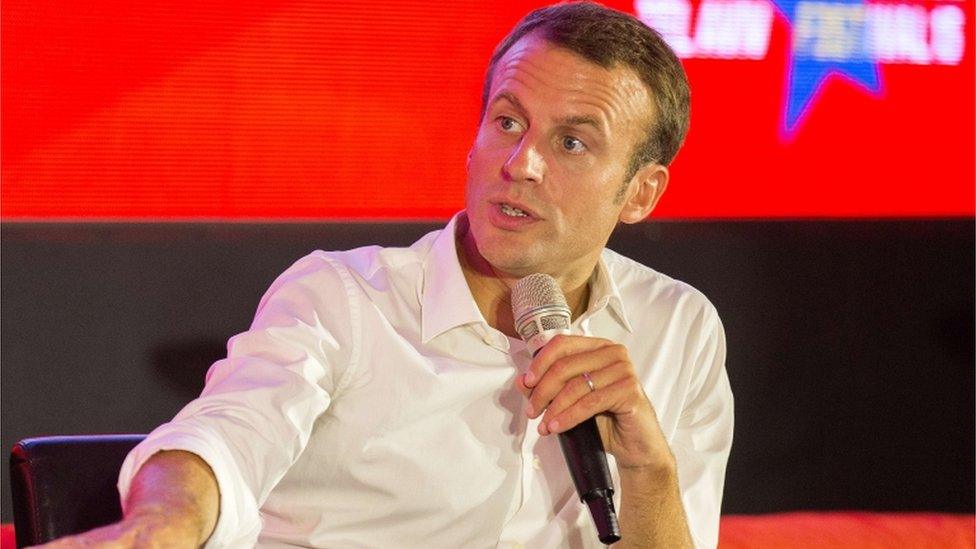
Emmanuel Macron has been on the road promoting opportunities in France
So what truth is there in the claim that the French digital "ecosystem" is beginning to produce the goods?
"It is not an exaggeration. Things really have changed in Paris in the last couple of years," says Christopher Ciminelli, who runs the tech news website 01net.com, external.
"Business creators in France are younger and younger. The government is genuinely taking steps to help. I would say the whole image of France abroad - certainly in the digital field - has become very positive."
The list of successful ventures is certainly beginning to catch the eye.
Top of the list are three French digital companies that are valued at more than $1bn.
These are the internet ad-placing company Criteo, external; the flash-sales pioneer Vente Privee, external; and the car-sharing facilitator BlaBlaCar, external.
BlaBlaCar's founder Fred Mazzella explained to me the changes that have helped his company reach 20 million customers in 19 countries.
"Over the last couple of years the system of financing - which was a real problem in France - has been transformed. Before, there were gaps in the financing chain from business angels to large professional investors.
"But today there are many new types of investor in Paris - like the entrepreneurial fund ISAI, external - and you can raise anything from one to a hundred million euros. It's made a huge difference, turning start-ups into scale-ups."
Another factor is the spread of incubators - places like The Family, external, NUMA, external, and 50Partners, external - which provide not just a physical base for new companies, but also advice and knowhow.
From the government side, Mazzella praises initiatives such as the Research Tax Credit, external, which means start-ups can get reimbursed up to three-quarters of their spending on research projects.
But the big shift has been one of mentality.
"A few years ago, all the top students who came out of the best 'grandes ecoles' - their ambition was to work in the established giants like BNP or L'Oreal," says Mazzella.
"Now they all say they want their work in start-ups and build their own."

France's biggest companies:
Total (Petroleum refining)
AXA (Insurance)
BNP Paribas (Banking)
Societe Generale (Banking)
Credit Agricole (Banking)
Carrefour (Food and drug stores)
GDF Suez (Energy)
Electricite de France (Utilities)
Peugeot (Motor vehicles)
Group Auchan (Food and drug stores)
Source: Fortune Global 500

Of course it is in the interest of Mazzella, Macron et al to talk up France as much as possible. They need the investors and they need the brains.
And not all may be as rosy as they like to portray.
In Israel last week, venture capitalist Yoav Tzruya said French start-ups were still "too happy to stay on the French market, rather than having global ambitions. And they still need better financing."
Macron himself admitted France was "15 years late when it comes to finance - but we are stepping up the pace".
Compared to London, Paris still lags far behind when it comes to attracting outside money.
According to Management Today, Paris drew under 400 Tech Investment Projects in the past decade against London's more than 1,000.

Foreign direct investment projects (2005-2014):
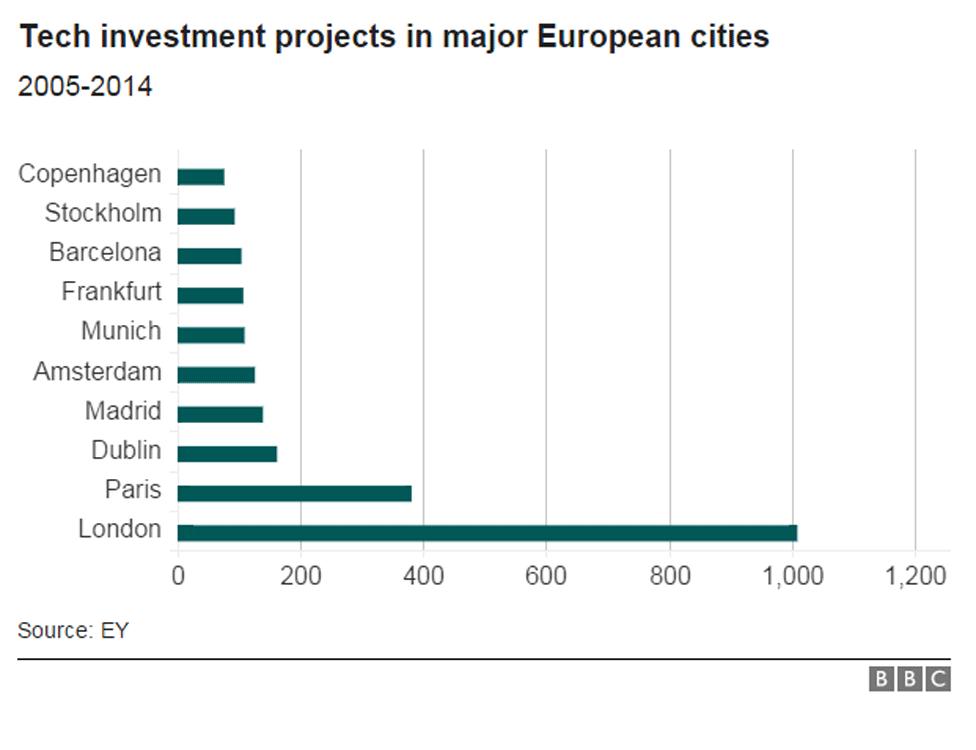
London: 1,009
Paris: 381
Dublin: 162
Madrid: 139
Amsterdam: 126
Munich: 109
Frankfurt: 107
Barcelona: 104

And there remains France's reputation as a high-tax country with an overweening state sector. Le French-bashing is not exactly out of fashion.
Still, one constant has held true through the hi-tech explosion: the ability of French grandes ecoles to turn out highly competent computer engineers and business modellers.
These are the people scooped up by the thousand in California and London.
And these are the Leons now being urged to come home.
- Published10 December 2014
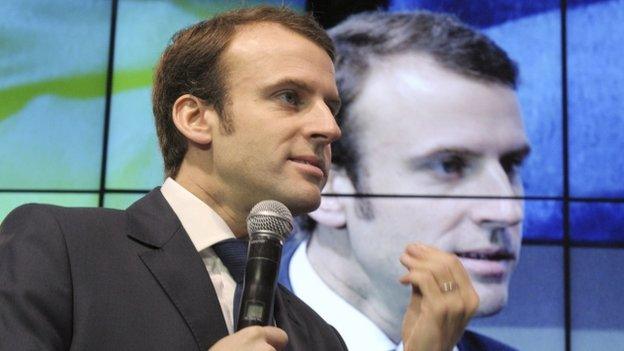
- Published24 November 2014
